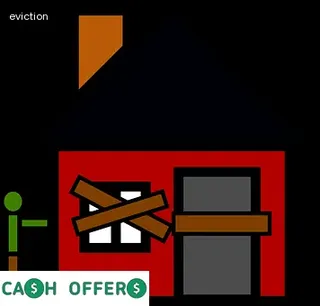Abandonment of property as it pertains to landlords in Florida is a complex issue that requires understanding of the definition of abandonment and legal implications. A landlord must be aware of their rights, obligations and legal remedies when dealing with property abandonment.
Generally speaking, abandonment occurs when the tenant has either voluntarily or involuntarily vacated the premises without properly notifying the landlord and has no intention of returning to the property. This can be evidenced by nonpayment of rent, leaving behind personal belongings, or through general neglect of the property.
In Florida, landlords are allowed to enter abandoned properties under certain circumstances but must comply with state laws on how to handle such situations prior to taking any action. Landlords should also consider other aspects such as whether the tenant’s security deposit is still due and what steps are required for proper disposal of remaining items left behind by an abandoned tenant.
The key for all landlords is to understand the legal implications associated with handling an abandoned property in Florida before taking action themselves.

In Florida, property abandonment is a serious issue that affects landlords and other property owners. As such, it is important for them to understand the state's abandonment notice requirements and procedure in order to take the necessary legal action.
According to state law, a landlord must give written notice of abandonment before taking possession of the rental property. This notice must include specific information regarding the tenant's failure to pay rent or their violation of their lease agreement.
Furthermore, if the tenant has abandoned personal property inside the rental unit, then the landlord must wait seven days before disposing of it in accordance with applicable laws. Additionally, if the tenant has left without notifying anyone or providing a forwarding address, then they are considered as having abandoned the premises and must be given an additional 14 days' notice by registered mail before being legally evicted from their rental unit.
It is important for landlords to remember that they are required to follow all applicable laws when handling property abandonment in Florida in order to protect both themselves and their tenants.
As a landlord in Florida, it is important to understand the legal rights and responsibilities when dealing with property abandonment. The Landlord Tenant Act outlines the various remedies available to landlords when tenants leave their property without notice.
Depending on the type of tenancy, landlords may be able to reclaim possession of the premises, terminate the lease and demand payment for rent due or past due, recover damages or other fees, or file an eviction lawsuit. Security deposits are also subject to certain regulations and must be returned within a certain period of time under Florida law.
Landlords should seek legal advice if they feel their rights have been violated or if they have any questions about handling property abandonment in Florida. It is important to ensure that all steps taken are done so in compliance with all applicable state laws and regulations.

In the state of Florida, personal property is considered abandoned when it has been left on a premises by its owner with no intention of returning. This may be in the form of tangible items such as furniture, appliances and clothing or intangible items such as deposits, security deposits and other payments made to the landlord.
If a tenant has left personal property behind without notifying their landlord, then the landlord has the legal right to consider that property abandoned. The landlord must then follow certain procedures in order to lawfully dispose of any personal belongings found on their premises.
These procedures include providing written notice to the tenant that they have 14 days to remove their possessions from the property before it is disposed of and conducting an inventory of any items that are being considered for disposal. Additionally, landlords must also provide an opportunity for tenants to dispute any claims regarding abandoned personal property before it is removed from the premises.
Eviction lawyers have the expertise to help landlords secure tenant evictions for residential and commercial properties in Florida. In cases of property abandonment, they can provide legal remedies that are compliant with state laws.
Eviction lawyers can provide the necessary documentation to prove that a tenant has abandoned the property, as well as advise on how to proceed with the eviction process. They can also help landlords understand their rights when it comes to collecting rent and security deposits, filing paperwork with the court, serving notice to tenants and other important steps in the eviction process.
With their knowledge of local laws, eviction lawyers can help ensure that landlords receive fair treatment and just compensation for rent arrears or damaged property.

Landlords in Florida who encounter the issue of property abandonment can find relief through flat fee legal assistance for tenant evictions. The process for evicting a tenant under such circumstances is often complex and lengthy, and landlords who are dealing with this scenario may not have the resources to navigate all the necessary steps.
Fortunately, with legal assistance that charges a flat fee, it is possible to obtain representation that will help resolve the situation quickly, efficiently and fairly. An experienced attorney can provide guidance on what needs to be done to start the eviction proceedings as well as how to handle any potential disputes or complications that may arise.
Additionally, they can offer advice on best practices for dealing with abandoned property and other related matters. With their help, landlords in Florida can ensure their rights are protected while also seeking justice for any damages caused by a tenant’s abandonment of their rental property.
At our firm, we specialize in providing legal assistance for landlords dealing with disputes with tenants, rental property issues, and other real estate matters. We understand how challenging it can be to handle property abandonment in the state of Florida and strive to provide trustworthy guidance to those who need it.
Our experienced team will help guide you through the entire process, from understanding landlord-tenant laws to responding appropriately when abandonment occurs. With our services, you can rest assured knowing that your rights as a landlord are being protected so that you can focus on running your business.
We have years of experience resolving rental issues and have an excellent track record of successful outcomes. For any questions or concerns related to handling property abandonment in Florida, reach out to us today and let us help you find the right solution.

When a tenant abandons their property in Florida, the landlord must take certain steps to legally protect themselves. Under Florida law, if a tenant abandons the rental property without any notice or warning, the landlord may enter and take possession of it.
However, the landlord must do so in accordance with Florida's Landlord Tenant Act. The first step is to send a written notice to the tenant with an indication that they have abandoned the premises and include a statement that all personal property left behind will be disposed of within 15 days unless it is claimed by the tenant before then.
The landlord does not have to store or keep any of the abandoned property; instead, it can be discarded or donated to charity. If there are items of significant value left behind such as furniture or appliances, then the landlord should consider selling them in order to recoup some of their losses.
Lastly, if there is any unpaid rent due from the tenant, then they can seek a claim for damages through small claims court or file an eviction action against them. By taking these steps, landlords can ensure that they are able to handle property abandonment in Florida legally and effectively.
If you are a landlord in Florida dealing with an eviction case involving the abandonment of property, it is important to remember that you have legal options available which can help resolve the matter. It is often wise to seek guidance from a qualified legal professional when navigating the complexities of evictions and other real estate laws.
An experienced attorney can provide advice on how to best handle your current situation, such as filing for possession of the abandoned property. Additionally, they may be able to assist with any related claims or disputes such as rent arrears or damage to the premises.
Depending on your circumstances, it may also be possible to seek compensation for any unpaid rent or damages through a court order. Ultimately, seeking professional advice can help ensure that your rights as a landlord are upheld and that your desired outcome is achieved in an efficient manner.

If you're a landlord in Florida who is dealing with a tenant eviction situation, it's important to know what your legal rights and remedies are. Hiring an experienced attorney can help ensure that the tenant eviction process is handled efficiently and effectively.
Our team of experts at [Company Name] have years of experience successfully navigating the complexities of Florida property law. We understand the importance of quickly and efficiently resolving any legal issues related to tenancies, especially when it comes to property abandonment.
Our attorneys will take the time to review all of your documents, explain your rights as a landlord, and then help you develop an effective strategy for handling the eviction process. With our extensive knowledge of Florida property law and our commitment to providing superior service, you can trust us to handle your tenant evictions with skill and precision.
When a tenant abandons property in Florida, landlords are required to properly handle the disposal of the items. To begin, it is important for landlords to give notice to the tenant stating that they have abandoned the property and must remove it within a certain period of time.
If the tenant fails to respond and retrieve the property, then landlords may proceed with disposing of it. In order to do so legally, landlords must follow state and local laws dictating proper disposal methods.
Generally, this involves donating any usable items while throwing away anything that cannot be donated. Additionally, any hazardous materials such as hazardous chemicals or paint cans should be disposed at a county waste management facility.
It is also important for landlords to keep detailed records of all abandoned property including receipts from donation or disposal sites. This will help protect them should any legal action arise from tenants claiming their property was not disposed properly.

When dealing with unwanted tenants' belongings, it is important to be aware of the laws and regulations associated with property abandonment in Florida. Landlords need to make sure they are in compliance with the state's landlord-tenant laws, as well as any local ordinances that may apply.
The landlord should also determine whether the tenant has left behind any personal items or property of value. If so, legal steps must be taken to secure the tenant’s possessions in a safe location until such time as they can be reclaimed by their rightful owner.
Furthermore, landlords should be aware of their responsibility for properly disposing of items left behind by the tenant that have no value or may be considered hazardous or unsafe. It is important for landlords to understand their rights and responsibilities when handling unwanted tenants' belongings, in order to protect themselves from potential liability issues that could arise from improper disposal or storage of abandoned property.
If landlords fail to abide by the proper abandonment procedures in Florida, they could face serious consequences. Not following the required laws and regulations can have legal ramifications, such as possible fines or even criminal charges.
Furthermore, any attempts to recoup rent from an abandoned property may be considered unlawful if the proper steps were not taken to handle the abandonment. Additionally, a landlord who does not utilize proper abandonment procedures may not be able to evict a tenant for nonpayment of rent or other lease violations if the tenant has already left their residence.
If a landlord does not follow the correct steps for addressing abandonment, it can also result in complications should they need to pursue legal action against a former tenant. It is essential that landlords understand and properly handle property abandonment in Florida in order to avoid these potential risks and liabilities.

When a tenant abandons their rental property in Florida, the landlord has legal options to take ownership of this property. The first step is to file a Complaint for Unlawful Detainer with the local court, which will initiate an eviction process against the tenant.
Once the landlord has obtained a Writ of Possession from the court, they can then file an Affidavit of Abandonment with the clerk's office in their county and provide proof of ownership. This affidavit will officially transfer title and ownership of the abandoned property to the landlord.
Furthermore, if there are any personal belongings left by the tenant on-site, landlords must give proper notice to notify them that they have up to fifteen days to retrieve their items before they are disposed of. Finally, it is important for landlords to document all steps taken throughout this process in order to protect themselves from any potential legal disputes or liabilities related to taking possession of abandoned property.
When a tenant has abandoned a rental property in Florida and the landlord is unable to recover the security deposit, there are several legal remedies available. A landlord may file an eviction action, which could result in a judgment for damages that can be used to recover the security deposit, or they may pursue a breach of contract claim against the tenant.
Additionally, if the landlord is able to locate the tenant, they may be able to negotiate for return of the security deposit through an informal settlement agreement. In some cases, it may be possible to garnish wages or bank accounts of the tenant in order to recoup the lost funds.
Finally, landlords can also seek relief from their insurance provider by filing a claim under their policy's personal property coverage. Although recovering security deposits after tenants have left can be difficult, with proper legal guidance and assistance landlords can ensure that their rights are protected.

In Florida, if a tenant abandons the property they have been renting, the landlord has certain legal remedies available to them. One of these is the ability to place a lien on the abandoned property.
This allows the landlord to recover any unpaid rent or fees that are due from the tenant. Additionally, landlords must also be aware of unclaimed assets left behind in the property.
These assets may include furniture, electronics, jewelry, and other valuable items that can be repurposed or sold. Furthermore, if there are any bank accounts associated with the tenant’s name, they may also fall under unclaimed assets which can be claimed by the landlord in exchange for services provided prior to abandonment.
It is important for landlords to familiarize themselves with their state’s lien laws and understand how these laws apply in cases of abandonment. Taking advantage of these legal remedies can provide much needed relief and resources for landlords dealing with an abandoned rental property.
In Florida, there are specific time limits that landlords must adhere to when it comes to keeping or disposing of unclaimed property. The state's laws provide a framework for how long landlords must maintain and store abandoned items, as well as the timeline for disposal or transfer of the goods.
Landlords must inspect the abandoned property within seven days and determine if it is worth more than $500; if so, they must notify the local law enforcement agency within 48 hours. If the value of the goods is under $500, then landlords can store them onsite for 45 days before disposing of them.
Any money found in an unclaimed safe deposit box will be held by the landlord for up to five years if no one claims it during that period. Furthermore, any money that tenants have left behind in a rental unit can only be kept by landlords for 90 days; after this point, they are required to transfer it to a court-appointed custodian or turn it over to the state.
It's important for Florida landlords to abide by these time limits in order to avoid legal consequences.

When handling the possessions of an abandoner in Florida, it is important for landlords to take steps to protect themselves legally. First, a landlord should always make sure that there is a written lease agreement in place before taking possession of any property.
Additionally, landlords should familiarize themselves with the laws regarding abandonment and eviction in the state of Florida to ensure that they are following all applicable regulations. Furthermore, it is essential to keep extensive records of all conversations and interactions with the tenant, as well as any attempts to collect unpaid rent or other expenses.
Landlords should also be aware of their rights when it comes to disposing of abandoned items; for example, if a tenant has left furniture or other large items behind, landlords may be able to sell or donate these items in order to recoup some of their losses from unpaid rent or other expenses. Finally, it is important for landlords to document any damages done by the abandoner so that they can seek compensation from them if necessary.
Taking these precautions will help landlords protect themselves legally when handling an abandonee's possessions in Florida.
When dealing with property abandonment in Florida, it is important for landlords to understand their legal remedies for managing storage fees associated with unclaimed possessions. It is the landlord’s responsibility to provide written notice of the tenant’s rights and obligations, including a provision that allows for storage of the tenant’s personal property on the premises for a determined period of time.
If after this time has elapsed and no arrangements have been made by the tenant to reclaim their belongings, then the landlord can take possession of them and mitigate any losses through reasonable storage fees. Landlords must also abide by state laws regarding sale or disposal of any abandoned items, including notification requirements and compliance with local ordinances.
Furthermore, they should remain aware of any changes in legislation which may affect their ability to collect fees or retain possession of the tenant’s property. By following these guidelines, landlords can ensure their legal right to manage their properties efficiently while protecting themselves from potential liability.
In Florida, the law is quite clear when it comes to defining property abandonment by a tenant. According to the law, a tenant must have been absent from the rental property for a period of 7 days in order for their tenancy to be considered abandoned.
This means that if a tenant has not returned or made contact with the landlord after 7 days of vacating their dwelling, they are legally considered to have abandoned their tenancy. Landlords should take note that this period of 7 days must pass before any legal remedies can be taken regarding abandonment on their part.
In addition, landlords should ensure that all other state and local laws regarding tenant rights and landlord obligations are met prior to taking action.

When a tenant leaves belongings behind in Florida, landlords should take the necessary steps to ensure the safekeeping of property. The first step is to check local laws and ordinances to determine what authority they have in removing the tenant's property.
In many cases, landlords are allowed to remove abandoned items after providing written notice to the tenant that details what will happen if personal property is not removed within a certain period of time. Landlords may also be required by law to store any personal items left behind for a certain amount of time and provide the tenant with an itemized list of stored items.
In addition, landlords must follow additional regulations for disposing of any hazardous materials such as paint, chemicals or fuel that may have been left behind. Although this process can be time-consuming, it helps protect both the landlord and their tenants from potential legal issues down the line.
In Florida, the term 'abandonment of property' can refer to a wide range of circumstances in which a tenant terminates rental occupancy without properly notifying the landlord. Common scenarios include when a tenant has moved out and left behind personal property or failed to pay rent for an extended period of time.
The legal remedies available to landlords depend on how abandonment is defined in the relevant jurisdiction, as well as other state and federal laws that may apply. In most cases, however, landlords have the right to enter abandoned premises and reclaim any personal property left behind by tenants.
Landlords may also be able to take legal action against tenants who have not paid their rent, though they may need to obtain a court order first. As always, it's important for landlords to consult with an experienced lawyer before taking any steps related to abandoned property in Florida.
In Florida, landlords must take prompt action when tenants abandon their property on the premises. Under Florida law, landlords have a legal right to take possession of abandoned property after the tenant has vacated and left belongings behind.
The landlord must begin by sending a written notice to the tenant informing them that they must remove their belongings within seven days or the landlord will dispose of them. If the tenant fails to respond and remove their property within this time frame, then the landlord can legally dispose of it.
Landlords should be aware that there are certain restrictions as to what they can do with any proceeds obtained from selling or disposing of abandoned personal property. Furthermore, landlords should also be aware that if they fail to abide by these laws when handling abandoned property in Florida, they may face civil lawsuits from tenants seeking damages for any losses incurred from improper disposal or sale of personal items.
A: In the event of a tenant abandonment, a Lessor in Florida must be sure to follow all state laws and regulations concerning Landlord and Tenant Leases. This includes taking steps such as properly notifying the tenant of the abandonment, re-renting the property, and deducting any unpaid rent from the security deposit.
A: If a Tenant abandons their property in Florida, the Lessor is responsible for securing the premises and mitigating damages. The Lessor should also take steps to protect themselves such as providing notice to the tenant, filing an eviction action, or initiating other legal action as necessary.

A: In Florida, a Lessor must send a written notice to the Tenant and then file a claim with the States Treasury after seven days have passed. The notice must inform the Tenant that if they do not respond within 15 days, then the property will be considered abandoned.
A: The Lessor should inform the local police department that the tenant has abandoned the property and provide them with a description of the tenant. Depending on the circumstances, they may be able to pursue further legal remedies such as eviction or collection of unpaid rent.
A: In South Florida, if a Tenant abandons a property, the Lessor must legally notify them of their breach of contract and terminate the lease. The Lessor may then take possession of the property and store or dispose of any personal belongings left behind. The Lessor may also pursue legal action against the Tenant to recover any unpaid rent or other damages incurred due to abandonment.
A: The Lessor should take reasonable care to protect the abandoned property and its contents, as well as bear any costs associated with such protection. If the Lessor wishes to take ownership of the property, they may need to file a formal action for Unlawful Detainer or seek legal counsel from a Property Management expert.
A: A Lessor in Florida should take reasonable steps to re-rent the property and document any efforts made. Reasonable steps may include advertising the unit for rent, showing the unit to prospective tenants, and keeping records of all communication with the tenant regarding the abandonment. If successful, the Lessor can offset any lost rental income against what is owed by the tenant.
A: In Florida, if a Tenant abandons their property, the Lessor should contact their Condominium Association to initiate the disposal process. The Lessor should email the Condominium Association to provide details of the abandoned property, and should be prepared to prove that they are the owner or have authority over it. Once notified, the Condominium Association will typically arrange for an auction of the abandoned property to dispose of it.
A: If a tenant abandons the property, the owner of the property should take possession of it and exercise reasonable care in storing the items left behind. The owner should also determine the value of any items left behind and dispose of them appropriately.